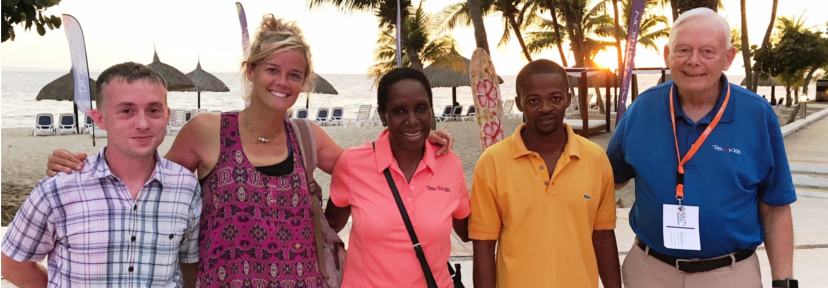Lindsay Anderson, Gary Boice, Michael Boice, William Philippe and I participated in the 2018 Haiti Tech Summit held June 21-23 at Cote Des Arcadin, Haiti. It was one of the most positive events I have experienced in Haiti! Christine Souffrant Ntim, founder of the Haiti Tech Summit organization, also known as the Global Startup Ecosystem (GSE), opened the conference with the declaration that “Haiti is not open for business, it is open for disruption.” Her statement set the tone for the activities of the two-day summit. The Haiti Tech Summit is part of a 13-year initiative of the GSE. The goal of the summit is to help entrepreneurs in Haiti build businesses in their communities to support the development of a sustainable economy for their country. For the purpose of this discussion, I have learned to adopt “ecosystem” as the language for the business development environment.
There were approximately 300-400 people in attendance at the summit including guest speakers, sponsors and panel discussion leaders. Some of the high level guest speakers included the Haitian president, Jovenele Moise, the US Ambassador to Haiti, Michele Sison and the founder/CEO of Twitter, Jack Dorsey. Google and Facebook were major sponsors from Silicon Valley and many tech-savvy young Haitian Americans, known as the “diaspora,” participated. There were a number of other sponsors, including Intuit, MasterCard, Digicel and Catholic Relief Services. We made significant connections with US Embassy staff members who attended and others who want to visit Jeremie to learn more about the work of Tek4Kids.
I had heard the word “diaspora” before, but had never focused on the fact that I am part of the diaspora, which is a large group of people with a similar heritage or homeland (Haiti) who have since scattered to places all over the world. When President Moise addressed the crowd, he highlighted the importance of the Haitian diaspora around the world in the future development of Haiti. The diaspora panel was animated and wants to reverse the narrative about Haiti in a meaningful way to highlight the positive things about Haiti’s culture and history. There was the general tone that Haiti needs to move away from the failed non-profit charity model to the for-profit model in order to create a sustainable economy and jobs. Since every sector in the Haitian economy is broken, technology seems to be the great hope and game-changer for overcoming the status quo because it requires problem solving capabilities and thinking “outside the box.”
Those on the diaspora panel said Haiti is a place where they should expect a workforce with work ethics, capable of providing quality products and services to sustain a vibrant economy, thus elevating the quality of life for workers. All of this sounds great, but without an education system to prepare workers, this is a challenging endeavor. I believe the GSE should address the Haitian education system, so I proposed a tech education panel to Christine Ntim for next year’s summit.
The Tech Summit platform is a very optimistic vehicle focusing on bringing sustainable changes to the business structure in Haiti by using technology to support growth and accessibility in all corners of Haiti. This is a great platform for Tek4Kids to explore and participate in, as it brings us out of Jeremie to work with the movers and shakers of Haiti, as well as validating our long-standing approach to the sustainable elimination of poverty through education and technology. The summit also supported our commitment to using English as the language of business in Haiti, as it was conducted almost entirely in English. Our challenge for the immediate future is learning to connect with this platform to support our technology education integration program, St. Francis School of Technology and the business enterprise TIC.
— by Maryse King, Tek4Kids Strategic Relationships Director
